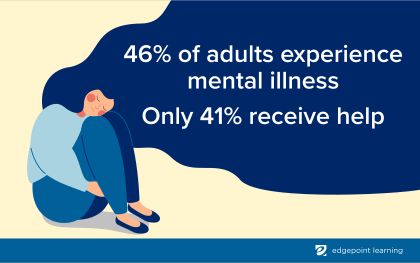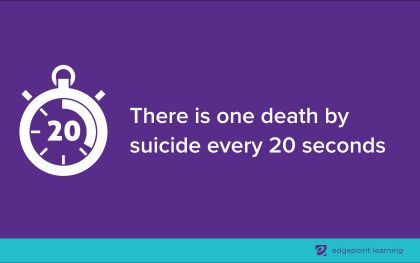What Is Mental Health Training And How Could It Help My Team?
Corey Bleich
🍿 5 min. read
When it comes to mental health training, there is no time like the present to get started.
Whether your company has one small office in a rural town or is staffed by thousands of workers across multiple continents, ensuring all of your employees have access to high quality mental health training is crucial to their success. Here's what your training should include and how to roll it out to your employees.
What is mental health training?
Mental health training teaches employees about common mental health conditions. Done well, it reduces the stigma surrounding mental health issues and teaches people to spot warning signs for complex mental health issues, such as cyberbullying, trauma, PTSD, and depression/anxiety.
While all employees can benefit from this type of instruction, mental health training is most often given to people in caring roles or those who interact with the public. These can include:
- Teachers
- Healthcare providers
- First responders
- Librarians
- Social workers
In addition to the above professions, corporate mental health training looks to managers and administrators as important stewards of your employee's mental health. Many companies choose to train their managers to spot signs of excessive stress or other issues that might lead to mental health challenges among their staff.
Why is mental health training important?
Mental health issues are invisible illnesses.
A person can appear to be healthy and happy while concealing tremendous suffering. A broken leg in a cast is a visible sign of physical distress, but an employee experiencing mental health issues may seem outwardly fine.
Mental health training helps employees recognize the signs of mental distress in themselves and others. This helps them not only handle larger crises, but also to intervene before the distress becomes an emergency.
Consider the following statistics on mental health:
- Over 46% of adults in the U.S. will experience a mental illness in their lifetime. This could be anything from depressive disorders to anxiety to a response to trauma.
- Nearly 44 million people in the U.S. experience a mental health crisis each year.
- Of all of the people experiencing a mental health disorder in a given year, only 41% receive any kind of help.

Chances are good that almost half of your employees are experiencing some mental distress, with fewer than half of them getting help. Mental health training is a great interventional tool to help employees spot the warning signs—in themselves and in their clients, patients, or customers—so they get the help they need.
What types of topics should mental health training cover?
With over 200 recognized mental health disorders, it’s impossible to cover everything in one training program.
Fortunately, a few focuses can illuminate the larger topic enough to help employees with their daily work. These are just a few of the types of mental health trainings you might consider covering for your organization.
Corporate mental health training
Corporate mental health training is the broadest category, covering more practical topics that focus on preventing stress and burnout.
A learning program about this might focus on developing mentoring programs for new employees to help them feel less isolated and more supported or create mini courses to help employees manage time and take better daily care of their own mental health.
Suicide intervention and prevention
The rate of suicide is rising, with the World Health Organization predicting a rate of one death by suicide every 20 seconds by 2020.
Suicide intervention and prevention training helps employees recognize when other employees or clients are in trouble and gives them tools to help.

Addiction
Addiction to tobacco, alcohol, illicit drugs, and prescription opioids cost the U.S. an estimated 820 billion dollars a year in healthcare, lost wages, and other associated costs.
People who suffer from addiction need support and resources to treat these disorders. Online mental health training can provide confidential support to those who suffer and informational resources for the people who treat them.
Anxiety
Anxiety disorders are on the rise in the U.S. Unfortunately, many people have limited access to treatment options.
Anxiety is often diagnosed at 18, a time when youth are entering college or careers. Those who work with people of all ages can benefit from mental health training to spot the early signs of anxiety, chronic stress, and burnout.
Youth mental health
Cyberbullying, self-esteem issues, abuse issues, and eating disorders are topics that are particularly covered in youth-specific mental health training.
These courses are often required parts of teacher training courses as well as healthcare provider licensing.
First aid training for trauma or crisis
First responders, teachers, and healthcare providers need to know how to deal with mental health issues during a crisis or after trauma.
Consider the rise in school and workplace shootings and the assistance that survivors and those who are wounded might need. Equip your employees with knowledge on how to handle these incidents before they happen. Training can't compensate for the grief and trauma these acts cause, but it can help employees make better choices in the days, weeks, and months following an incident and connect them to additional resources.
What could a mental health training program look like?
The best mental health training program for your organization is one that:
- Fits your needs
- Is delivered in a way that employees can easily access it to apply during the course of their workday
- Allows you to meet any regulatory or licensing requirements for your company or school
At EdgePoint Learning, we have developed mental health courses for both the State of Alaska Department of Education & Early Development and suicide prevention organizations. For Alaska, we created over eight hours of suicide prevention and intervention eLearning courses, making them available to all school personnel. These are designed to train school staff to identify kids who may be suffering and successfully intervene to get them the help they need.
When the State of Arizona passed a law that requires anyone who works in a school and has contact with kids to have suicide intervention training every three years, we developed similar courses for Teen Lifeline (www.teenlifeline.org).
These online mental health training courses solved the problem of efficiently, affordably, and effectively delivering required training to a large number of employees across large geographic areas.
In your organization, start with a training needs analysis that considers any regulations or licensing requirements, then match your needs to an appropriate training approach. Maybe microlearning is best to deliver just-in-time snippets of information, or perhaps you need to consider a full suicide intervention/prevention program rolled out to your entire staff, overseen by expert instructors.
Whatever type of mental health training you need, EdgePoint Learning is here to help. We have extensive experience with corporate mental health training and can design a program from scratch. We can also offer support and resources as you design your own. Get in touch today to get started.
